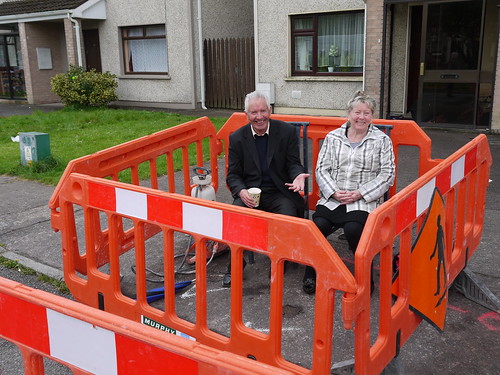Posts Tagged ‘Troika’
Socialist whodunnits, the Catholic Church and being ‘left in the lurch’.

Occupy march, Cork 2011
Q: To Keep A Bird Singing begins during the Crash in 2010. Noelie and Hannah, two of the main characters in the story, are keeping their heads above water. We meet Noelie for the first time in a charity shop. Was there a specific reason why you chose that time period for the story?
A: The Crash here in Ireland felt like a reckoning, the past catching up with us and exacting revenge. There had been so much hot air around the Celtic Tiger and that it had heralded a new dawn in Irish history – we were a country that people were immigrating into rather than emigrating from for a change. Then, that ended. Austerity, cuts, unemployment, mass emigration all over again. A time of reckoning is a time when you look more closely at what’s going on around you; maybe it’s a bit late in the day but you do it anyway. I think that’s some of the backdrop to the story.
Q: And Noelie and Hannah?
A: They are ‘stayers’. What I mean is that when the Crash hit, people left in droves once more. It’s national affliction 😉 ‘Oh there’a problem here, right I’ll be off so.’ However Noelie is older, in his late forties when the story gets underway. He’s been made unemployed, as many were, and he feels less able for emigration. He has to stay and that means he is more prepared to ask questions about the Ireland he is stuck in. Which is what gets him into trouble.
Q: It isn’t clear at first what Noelie has stumbled in to. In the beginning the story is light-hearted. He finds his missing punk records collection. It seems like a lucky break. Then matters rapidly descend into danger.

Bell & Howell Home Movie Camera c. 1960
A: What do you do when the cops are the criminals? It’s a problem, right? The normal avenues of complaint aren’t open to you. In To Keep A Bird Singing, Noelie and Hannah learn about the plight of a local man, Jim Dalton who has gone missing. It soon becomes clear that the cops, Special Branch that is, are probably involved. That’s how the story gets going and that’s when things really start to get difficult for them.
Q: So the cops are not heroes?
A: There is one very good cop in the book but he’s dead. Another more minor character, a police woman, is also portrayed in a positive light. So they are not all bad. Far from it. But the story in a way is about those elements of the police involved in the secret state.
Q: Which means what?
A: The activities of Special Branch and others elements inside the state security apparatus who are a law onto themselves. In the UK you have had the likes of Mark Kennedy and his involvement in deep infiltration, targeting left-wing groups, trade union activists and environmentalists. Absolutely corrupt, disgraceful activity sanctioned high up inside the police force. In Northern Ireland too all sorts of criminal activities were engaged in by RUC Special Branch. Collusion with Loyalist paramilitaries in conjunction with M15. Sectarian killings were orchestrated to stoke up sectarian hatred. There was state involvement with death squads. And we shouldn’t forget what happened at Kincora House in Belfast where elements in state security knowingly looked the other way when informed that child abuse was taking place.

Memorial at St Patrick’s School for Boys [Upton, Co. Cork]
Q: Pretty ugly.
A: It doesn’t get much uglier.
Q: The book has been described as a socialist whodunit. Is this because of the focus on this secret state?
A: Ellie O’Byrne in the Irish Examiner called it that. I guess it is the issues that arise in the story but I think it is also a description that emerges from the characters in the story. The Crash has hit and both Noelie and Hannah are feeling the pinch. However both of them have activism in their background – of the grassroots kind, I mean. Noelie in particular was stuck in a campaign against the Council’s decision to privatise rubbish collection and so on. The anti-austerity protests are also in the air as the novel opens, and Noelie’s thinking of getting involved. The key characters are lefties.
Q: They cross swords with powerful people. The shadow of the Catholic church is there. The business community is also close to hand. What sort of Ireland is this?
A: Things are changing in Ireland – as evidenced by recent victory in the repeal of the 8th Amendment here [which banned abortions in the Republic.] However the Catholic Church is still a powerful force in terms of its wealth, influence and its connections. It still commands in sectors of the health service and in education. So the power of the Catholic Church is also the backdrop to the story.
Q: Noelie and Hannah could walk away from the trouble they see but they don’t?
A: They live in an Ireland where a lot of things have been swept under the carpet. The story is set in 2010 but in terms of the book, a year earlier a ground-breaking report had come out about the industrial school network in Ireland – the Ryan Report. This set out for all to see how brutal and vicious the systematic punishment of poor families and children had been in Ireland at the hands to the state and the Catholic Church. Another report in the air as the story gets underway has to do with the Catholic Church’s role in child abuse and in protecting clerical child abusers in the Dublin Archdiocese. Noelie and Hannah are living in an Ireland where it’s getting hard to look the other way.
Q: Although some people remain good at that. 
A: Indeed. But others stand up in extremely difficult situations when faced with injustice and wrongdoing perpetrated by the powerful. Sometimes – and I think we know this – standing up for what is right is, effectively, a death sentence and yet people do it. Near when I was finishing writing the book, the Honduran activist Berta Cáceres was shot dead by paramilitaries linked to state security. She was threatened with murder so many times but she wouldn’t give up. And they did murder her in the end. I think, for what it is worth, the story is trying to celebrate bravery but the bravery of the underdog.
Q: As To Keep A Bird Singing moves on we begin to see something a lot darker – a group of abusers are possibly involved. They have protection though, from on high, from inside the Irish state. Is this based on a real situation.
A: The story is fiction and in another sense it isn’t. Did the Irish state protect abusers? Without doubt, yes. The Catholic church wrecked havoc on the lives of many children in Ireland right up until recent times. Abuse happened and often it was known that if certain children were sent to certain places they would be abused there. The courts not only didn’t stop this, it insisted on sending these children into these place and then, further to that, it then protected the abusers who abused in those institutions. Take the case of Fr Donal Gallagher. He was a notorious abuser and there were a myriad of complaints made against him. His order, the Vincentians, did absolutely nothing of substance to stop him. But the Gardaí failed repeatedly to pursue him too. There is a quote in the Murphy Report [p357] which really tells it all in my view.
The sergeant who conducted the investigation [into Fr Gallagher] stated in his report: “Fr Gallagher is a professional man and strikes me as a sincere and genuine individual. I can see no useful purpose to be gained by the prosecution of Fr Gallagher at this late stage”.
So I think you could argue in general that, yes, the Irish state by being so consistently negligent did abet child abuse. Was there a more sinister angle to some of this convenient ‘negligence’ on behalf of the Irish state or people acting on its behalf? I think we’d be naive not to think so.
Q: Do you think your own politics has helped in writing the book?
A: Hugely. Your politics determine what way you look at the world. In crime writing and so on its hard to avoid politics in some way. Even the murder, mayhem and gore brigade deal with it because it is all around in almost anything that goes on. But ‘political’ crime in sense of criminality deriving from how society is structured, from the reality that we live with under capitalism, gets off very, very lightly. You have to go to the Continent, to Italy and France to find any substantial body of work. That’s the way it looks to me anyway. But there is also a certain amount of ‘feed people what they are used to eating’ attitude around too. The popular impression of crime is that it is mostly constituted by gangland based violence or vicious person-on-person crimes in which women in particular appear to come out the worse. ‘Political’ and ‘white collar’ crime, apart of course from people supposedly ripping off the dole say, is largely ignored. I remember an example a few years ago, to do with crime book related to the chemical industry. As I know something about the area I thought I’d have a read. Now there are no end of examples of pharmaceutical and chemical corporations plundering the environment to maximise their profits – engaging in criminal activities to get their way too. But who was the criminal in this book? It turned out to be a crusty environmental activist who having lost his bearings decided to pollute an entire river to get the local chemical plant in trouble. I mean really like. In other words plots that fit certain tropes which coincidentally just happen to support the status generally do better with agents and publishers. Big surprise?

Edward Snowden broke the bad news.
Q: Surveillance features as an important element of the story. But it only become clear as the story crisis deepens that it is having a crucial role in what is going to happen.
A: I think that’s it. If you don’t resist surveillance isn’t really an issue for you. If you do resist then the surveillance becomes a real factor that you have to contend with. Nowadays the state is able to spy right into the very heart of our lives and when it needs to it does so with a tap of a keyboard.
Q: In To Keep A Bird Singing, Noelie and Hannah don’t know who their enemies really are. The people they are up against are ‘faceless’ and some continue to be until the end.
A: This is another reality. I mean one of aspects of recent human rights abuse – everything from drone assassinations to rendition etc – is that the perpetrators are never identified. The State has at its disposal hired killers who we – the public – have no right to know about. I mean if we look closely at this it is beyond shocking. This ‘legitimate’ secrecy that the State has reserved for its covert operation in our name is a grave threat to our security. In To Keep A Bird Singing the faceless nature of those behind one of the deaths is a key factor. Can one ever get justice if one doesn’t even know the identify of the criminal involved? If they are protected by state secrecy legislation it’s nigh impossible.
Q: The story ends on a positive note but only just. Would you agree?
A: The story is not over. In a number of ways actually. As was pointed out to me by a kind reader of the book, Noelie has been left in the lurch, romantically speaking. So at the very least that has to be sorted. Other matters too are there to be followed up. But yes at the end of To Keep A Bird Singing, Noelie and his friends have made progress but at a price. It’s reality, no? It is very hard to get justice without making a sacrifice. Everyone who fought for the freedoms we now have – from advances in working conditions to women’s suffrage – put a lot on the line. They knew they had to but importantly they thought and knew it would be worth it too.
** My thanks to ml for taking the time to do this interview with me.
Links Suffer the Little Children and Haunting Cries are informative and disturbing accounts of the industrial schools network here in Ireland.
Industrial Memories – A response to the Ryan Report
Interview: The Irish Struggle Against Austerity

Now two years on from that time, we are finally getting to the bottom of a very deep hole. It has transpired that the debts in the banking sector were significantly larger than expected. The debts at Anglo Irish Bank were astronomical.
The current Government has nonetheless stood by its ‘word’ and as a result the Irish State has been sucked into the banking disaster. And there you have it: now we are being asked to pay for all of that!
This interview, conducted by Mike Harris, was published in Idea and Action (USA) here. A translation into Spanish is available here.
Note on photograph: Showing the Irish Gardaí mobilised to protect the Dáil (parliament) following a huge orotest march in Dublin against wage cuts and austerity.
Heroes of 2014 – Do You Agree?
Chomsky is famous for saying that a lot of people don’t know how the world really works and, more to the point, they don’t even know that they don’t know!
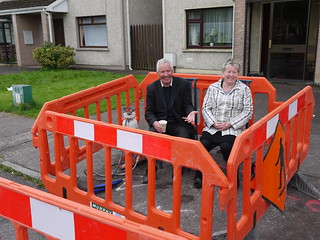
Direct action by Elmvale estate residents in Cork blocked Irish Water from installing water meters in their area.
There’s much truth to this claim, but with time other factors can come into play and these may alter the disturbing equation that he has set out.
This year, in Ireland, we saw the beginnings of a serious fight-back against austerity. It seemed, at one level, to ‘appear’ from nowhere, but did it really?
Austerity, in case you are in any doubt, has been the occasion for a massive transfer in wealth from the bottom half of society to the top echelons. Money aside, the so-called “1%” has also concentrated an even greater amount of power in its own hands – exemplified by a raft of discarded workplace agreements and unilaterally imposed pay cuts. Austerity, make no mistake, has been a good to the (already) wealthy!
But it is in the nature of highway robbery that, inevitably, it goes too far… And this year in Ireland a point was reached when a significant number of people said ‘Enough’. But the saying of ‘Enough’ didn’t just happen either.
Over the past year and more there have been people out there during long periods of endless protesting and agitating who did the work that made the saying of ‘enough’ possible. Here in Cork I know some of these people from my involvement in the Anti-Household Tax protest. Togher/ Ballyphenane are one notable group, for example, that were to the fore. So also were the activists in Cobh, in lower Cork harbour. In these areas, small groups of anti-austerity activists survived the defeat that was the Anti-Household Tax campaign and kept going. They were stalwart in their opposition to austerity and it has paid off for us all – so far.
I could name some names and in times those names should be recorded for the sake of honesty and to acknowledge the vital role these activists played in this fight-back; but not just now.
For the moment I just want to point the finger at the people pictured in the photo above. When Irish Water set about installing their meters in the estates on the edge of Cork city, it was the Togher and Ballyphane Anti-Water Tax group that stood their ground. They talked to people in the estates like Elmvale (in the south Cork city area) and the result was the action you see pictured here. Non-violent. Determined. Highly effective!
In the accompanying photo we see something captured that simply wasn’t visible for quite some time here in Ireland: it is austerity being held at bay.
The actions at Elmvale, in Lehenaghmore, in Rushbrook (to name just a few estates) produced a number of small but very highly significant victories that others around the country took hope and confidence from. The real heroes of Ireland 2014 are the people who stood up in these estates and said NO.
The Ballyphehane/ Togher activists showed that building the resistance takes effort, time and a lot of work. But they also showed that it is possible to win against austerity. Organise locally, be determined and spread the word.
Eight Photos from Austerity Ireland
Pensioners mobilise in Cork city against cuts in Medical Cards
[October 2008]

The severed head of Irish Taoiseach, Brian Cowen. Grand Parade, Cork City
[November 2009]
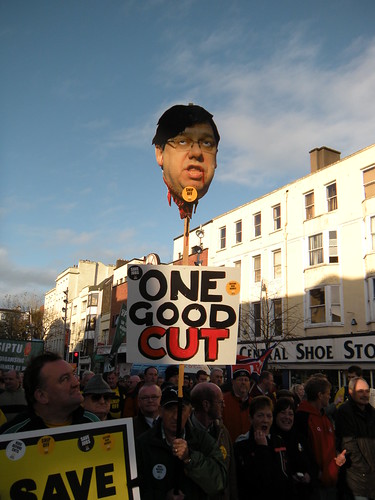
Not My Debt – Occupation of Anglo-Irish Bank offices in Cork city
[November 2010]
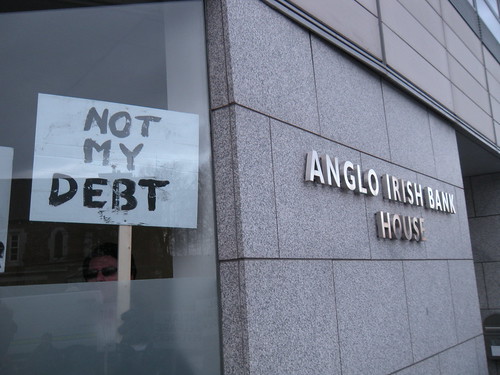
Gardaí protect the Dáil in Dublin
[November 2011]
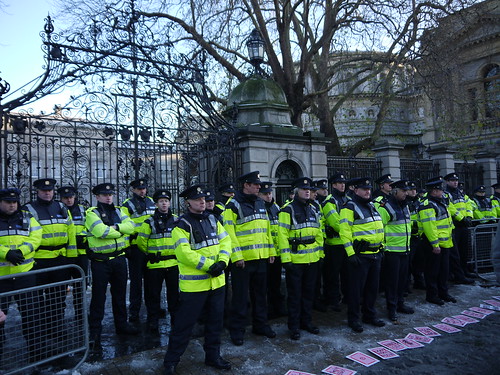
IMF Orders – Occupy Protest March in Cork City
[December 2012]
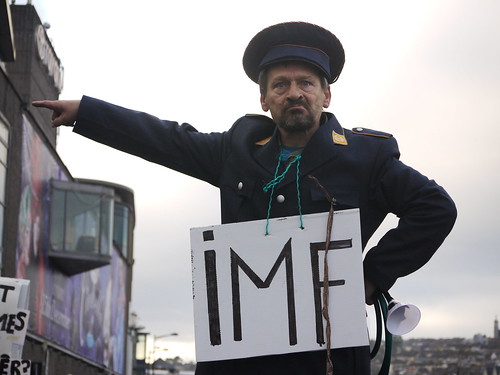
Vita Cortex – Let Them Go Home
[Feb 2012]
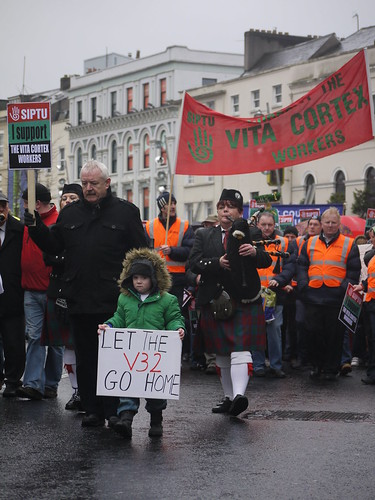
Cill Eoin ‘Ghost Estate’ in Kenmare, Co. Kerry
[April 2012]

ICTU “Lift The Burden” March in Cork City
[February 2013]
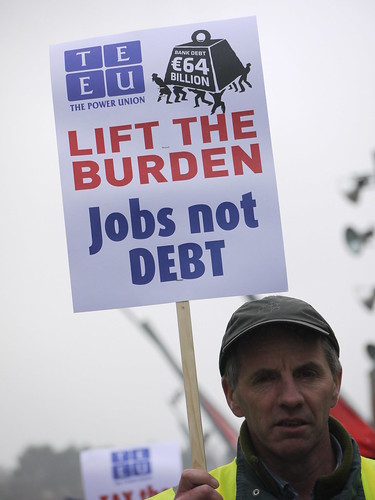
Anti-Household Tax March in Cork
[March 2013]
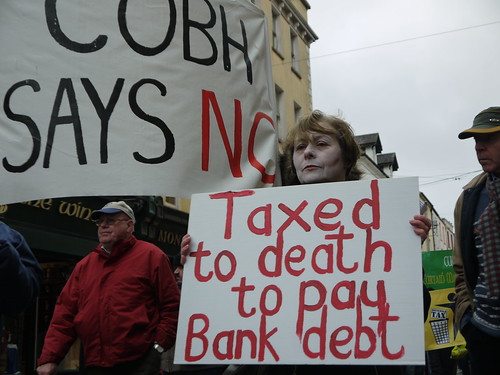
Anti-Water Meter Protest in Elmvale Estate, Cork
[April 2014]
“We Are Interred Here With Certain Rights… ”
 ‘We should march on City Hall,’ announced my mother. ‘That’s what I’ve been saying. Let’s make a stand.’ She raised her voice even higher. ‘Could City Hall hold out against us? Against all of us, I mean, the interred? Together, united, marching down Patrick Street? I don’t think so. All it takes…’
‘We should march on City Hall,’ announced my mother. ‘That’s what I’ve been saying. Let’s make a stand.’ She raised her voice even higher. ‘Could City Hall hold out against us? Against all of us, I mean, the interred? Together, united, marching down Patrick Street? I don’t think so. All it takes…’
We Should Be Beyond This, my short story about our plight, has just been published in the current issue of Southwords (No 25, December), the online journal of the Munster Literature Centre.
Please go here to read the story.
To view and read Southwords 25 go here.
We Should Be Beyond This was a commended runner-up in the 2013 Seán Ó Faoláin Prize judged by Joyce Russel. My thanks to the MLC for all their ongoing support for short story writers and the short story form.
“NEIN”/ Cork
Time to celebrate one of Cork’s best pieces of public art. “NEIN” is located on battered hoarding on Brian Boru Street, off Patrick’s Quay. Location is important, it seems to me, as this is a busy traffic junction in Cork City. it is well used by people coming and going to work.
So?
NEIN is plain and clear. Very emphatic. But who is speaking? The Cork public? A German government minister? An Irish Government Minister now speaking in her lingua franca. Or is it the German people who have issued forth?
And to whom is it directed at? Me, you? The Cork public? A German government minister? Or is sarcasm directed at Austerity’s poster boy, Enda Kenny?
Anyway … It’s there for a while longer on Brian Boru Street. When you’re in town have a look …
